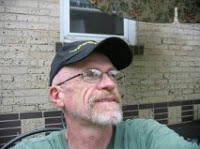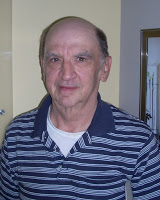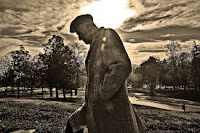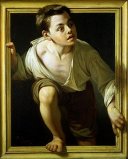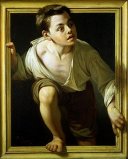My mother was peeling potatoes. I was standing beside her shelling peas. It was not a dark and stormy night, but it was a relatively dark and very stormy morning. As we prepared Sunday lunch the thunder crashed above us, echoing up and down the valley where we lived as it always did. My dad came into the kitchen, saying, as he always did when it thundered,
“By ‘eck, ‘ear that thunder rrrroll.”
(I chose this topic because I wanted to be able to say that! It wasn’t until I returned home after a year’s absence that I realized how strong a Welsh accent my father had. Of course, in my own defense, he was a man of so few words that perhaps it was not so surprising that I had never noticed his accent. By ‘eck, ‘ear that thunder rrrroll was about as verbose as he ever got!)
Mum and Dad and I all loved thunder storms. But this time my mother got a bit carried away in her enthusiasm and, potato peeler still in hand, opened the outside door to get a better look. Well, my mother never was the most practical of people! Simply opening the door invited the lightning bolt right in. It hit the knife blade, burned across the floor from Mum’s feet to the chimney corner, up the wall and it was gone. It happened so fast we might have thought we imagined it except for the black scorched trail it left behind. My mother felt nothing and, though speechless with surprise, was unhurt.
That little incident might, I suppose, have dampened my enthusiasm for thunder storms but it did not. Roaming around this country in our camper van for twenty years, Betsy and I have sat in many a campground, cozy inside our van, reveling in the thunder crashes and the lightning flashes, the rain streaming down the windows as the van rocked in the howling wind. We watched smugly as the poor unfortunate tent campers struggled, out in the pouring rain, to prevent their wildly flapping tents from taking flight and chased rolling camp-chairs through the trees. The most memorable that I recall was on a hilltop in Missouri from which there was a spectacular 360 degrees view. In any direction we looked, countless streaks of lightning ripped across the angry black sky, the lightning flashes lighting up the night all around us. It really was breathtaking.
I still love thunder storms, and still greet then eagerly, but must confess that in recent years they have tended to come, around here anyway, with accompanying hail storms which a do not welcome. They can be so damaging to so many things, not the least of which is one’s bank account.
Whenever I hear a good clap of serious thunder, I immediately hear my dad’s voice rejoicing.
“By ‘eck, ‘ear that thunder rrrroll!”
But sadly my love of the expression rolling thunder was dampened during the Vietnam War, when Operation Rolling Thunder consisted of a sustained aerial bombardment of North Vietnam lasting from 1965 to 1968. During that period it is estimated that we killed approximately 72,000 North Vietnamese civilians. Of course, I really had to dig to find those numbers. We rarely hear of actual human beings dying. We hear that during Operation Rolling Thunder we dropped 864,000 tons of bombs on the North, inflicting physical damage valued at $370 million. Nice clean unemotional impersonal statistics, proudly proclaimed under the inoffensive name Rolling Thunder.
Of course none of this began or ended with Vietnam. I am no military historian – nor do I want to be – but I think this practice of naming military operations began in World War Two for purposes of secrecy. And of course it involved many countries, not just the U.S. The Allies had operations under such harmless names as Primrose and Croquet, Stonewall and Teardrop. The Nazis had Wonderland, Rainbow, Reindeer and Buffalo. At least I can understand the need for secrecy, but today there is nothing secret about these operational names. Rather we shout them out for the world to hear, these harmless-sounding names. Desert Storm suggested nothing worse than a little blowing sand. Valiant Guardian, in Iraq, had something of the kindly uncle about it. Operation Crescent Wind in Afghanistan, an effort to bomb hell out of The Taliban, is suggestive of nothing more violent than a gentle parasail above the cliffs. If we called these Operations what they really are, they would boast names like Operation Spreading Terror or Operation Killing Anything That Moves. But we sanitize everything. We don’t murder innocent civilians. Instead we have collateral damage. Miriam-Webster defines collateral as: secondary, subordinate, indirect. I’ll bet it doesn’t seem any of those things to those who become collateral damage.
Good Lord, how on earth did I get so far off track? I suggested, and then chose, the anodyne topic of Rolling Thunder in order to have a gentle trip down Memory Lane. But somewhere I took a wrong turn and ended up in The Land of Ranting and Raving.
Enough!
The End
© November 2017
About the Author
I was born and raised in England. After graduation from college there, I moved to the U.S. and, having discovered Colorado, never left. I have lived in the Denver-Boulder area since 1965, working for 30 years at IBM. I married, raised four stepchildren, then got divorced after finally, in my forties, accepting myself as a lesbian. I have been with my wonderful partner Betsy for thirty years. We have been married since 2013.

